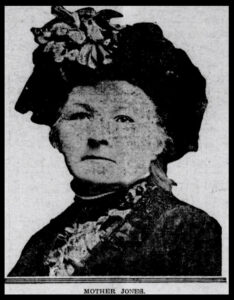
This, my friends, marks, in my estimation, the most remarkable move ever made in the State of West Virginia. It is a day that will mark history in the long ages to come. What is it? It is an uprising of the oppressed against the master class.
From this day on, my friends, Virginia–West Virginia–shall march in the front of the nation’s states. To me, I think, the proper thing to do is to read the purpose of our meeting here today–why these men have laid down their tools, why these men have come to the State House.
To His Excellency, William E. Glasscock,
Governor of the State of West Virginia:
It is respectfully represented unto your Excellency that the owners of the various coal mines doing business along the valley of Cabin Creek, Kanawha County, West Virginia, are maintaining and have at present in their employ a large force of armed guards, armed with Winchesters, a dangerous and deadly weapon; also having in their possession three Gatling guns, which they have stationed at commanding positions overlooking the Cabin Creek Valley, which said weapons said guards use for the purpose of brow-beating, intimidating and menacing the lives of all the citizens who live in said valley, and whose business calls them into said valley, who are not in accord with the management of the coal companies, which guards are cruel and their conduct toward the citizens is such that it would be impossible to give a detailed account of.
Therefore, suffice it to say, however, that they beat, abuse, maim and hold up citizens without process of law, deny freedom of speech, a provision guaranteed by the Constitution, deny the citizens to assemble in a peaceable manner for the purpose of discussing questions in which they are concerned. Said guards also hold up a vast body of laboring men who live at the mines, and so conduct themselves that a great number of men, women and children live in a state of constant fear, unrest and dread.
We hold that the stationing of said guards along the public highways, and public places is a menace to the general welfare of the state. That such action on the part of the companies in maintaining such guards is detrimental to the best interests of society and an outrage against the honor and dignity of the State of West Virginia. (Loud applause.)
As citizens interested in the public weal and general welfare, and believing that law and order, and peace, should ever abide, that the spirit of brotherly love and justice and freedom should everywhere exist, we must tender our petition that you would bring to bear all the powers of your office as Chief Executive of this State, for the purpose of disarming said guards and restoring to the citizens of said valley all the rights guaranteed by the Constitution of the United States and said State.
In duty bound, in behalf of the miners
of the State of West Virginia.
I want to say with all due respect to the Governor–I want to say to you that the Governor will not, cannot do anything, for this reason: The Governor was placed in this building by Scott and Elkins and he don’t dare oppose them. (Loud applause.) Therefore, you are asking the Governor of the State to do something that he cannot do without betraying the class he belongs to……
I still unfurl the red flag of industrial freedom, no tyrant’s face shall you know, and I call you today into that freedom, long perched on the bosom (Interrupted by applause).
I am back again to find you, my friends, in a state of industrial peonage–after ten years absence I find you in a state of industrial peonage.
I am not afraid of jails. We build the jails, and when we get ready we will put them behind the bars. That may happen very soon–things happen overnight.
Now, brothers, not in all the history of the labor movement have I got such an inspiration as I have got from you here today. Your banners are history, they will go down to the future ages, to the children unborn, to tell them the slave has risen, children must be free……
I want to show you here that the average wages you fellows get in this country is $500.00 a year. Before you get a thing to eat there is $20.00 taken out a month, which leaves about $24.00 a month.
Then you go the the “Pluck-me” stores and want to get something to eat for your wife, and you are off that day, and the child comes back and says, “Papa, I can’t get anything.” “Why,” he says, “There is four dollars coming to me,” and the child goes back crying, without a mouthful of anything to eat. The father goes to the “Pluck-me” store and says to the manager, “There is four dollars coming to me,” and the manager says, “Oh, no, we have kept that for rent!” “You charge six dollars a month, and there are only three days gone.” “Well,” he says, “it is a rule that two-thirds of the rent is to be kept if there is only a day.”
That is honesty! Do you wonder these women starve? Do you wonder at this uprising? And you fellows have stood it entirely too long. It is time now to put a stop to it. We will give the Governor until tomorrow night to take them guards out of Cabin Creek. (Very loud applause, and cries of: “And no longer.”)
HERE ON THE STEPS OF THE CAPITOL OF WEST VIRGINIA, I SAY THAT IF THE GOVERNOR WON’T MAKE THEM GO THEN WE WILL MAKE THEM GO……
I want to tell you that the Governor will get until tomorrow night, Friday night, to get rid of his blood-hounds, and if they are not gone we will get rid of them. (Loud applause.)
Aye, men! Aye, men, inside of this building, Aye, women! Come with me and see the horrible pictures, see the horrible condition the ruling class has put these women in. Aye, they destroy women. Look at those little children, the rising generation; yes, look at the little ones; yes, look at the women assaulted…..
It is freedom or death, and your children will be free. We are not going to leave a slave class to the coming generation, and I want to say to you that the next generation will not charge us for what we have done, they will charge and condemn us for what we have left undone…..
Now, my boys, guard rule and tyranny will have to go, there must be an end. I am going up Cabin Creek. I am going to hold meetings there. I am going to claim the right of an American citizen……
This fight that you are in is the great industrial revolution that is permeating the heart of men over the world. They see behind the clouds the Star that rose in Bethlehem nineteen hundred years ago, that is bringing the message of a better and nobler civilization. We are facing the hour. We are in it, men, the new day, we are here facing that Star that will free men, and give to the nation a nobler, grander, higher, truer, purer, better manhood. We are standing on the eve of that mighty hour when the motherhood of the nation will rise, and instead of clubs or picture shows or excursions she will devote her life to the training of the human mind, giving to the nation great men and women.
I see that hour. I see the Star breaking your chains; your chains will be broken, men. You will have to suffer more and more, but it won’t be long. There is an awakening among all the nations of the earth……
I know of the wrongs of humanity; I know your aching backs; I know your swimming heads; I know your little children suffer; I know your wives, when I have gone in and found her dead and found a babe nursing at the dead breast, and found the little girl eleven years old taking care of three children. She said, “Mother, will you wake up, baby is hungry and crying?” When I laid my hand on mamma she breathed her last. And the child of eleven had to become a mother to the children.
Oh, men, have you any hearts? Oh, men, do you feel? Oh, men, do you see the judgement day on the throne above, when you will be asked, “Where did you get your gold?” You stole it from these wretches. You murdered, you assassinated, you starved, you burned them to death, that you and your wives might have palaces, and that your wives might go to the sea-shore……
Some women get up with five dollars worth of paint on their cheeks, and have tooth brushes for their dogs, and say, “Oh, them horrible miners. Oh, that horrible old Mother Jones, that horrible old woman.”
I am horrible, I admit, and I want to be to you blood-sucking pirates. I want you, my boys, to buckle on your armor. This is the fighting age. This is not the age for cowards, put them out of the way……
This day marks the forward march of the workers in the state of West Virginia. Slavery and oppression will gradually die. The national government will get a record of this meeting. They will see men of intelligence, that they are not out to destroy but to build. And instead of the horrible homes you have got, we will build on their ruins homes for you and your children to live in, and we will build them on the ruins of the dog kennels which they wouldn’t keep their mules in. That will bring forth better ideas than the world has had. The day of oppression will be gone. I will be with you whether true or false. I will be with you at midnight or when the battle rages, when the last bullet ceases, but I will be in my joy…..
[Photograph added.]
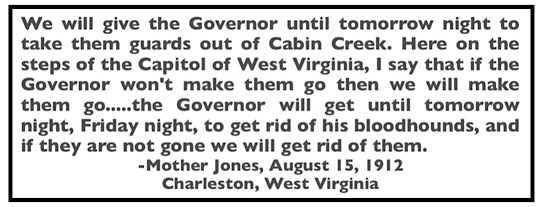 —————
—————
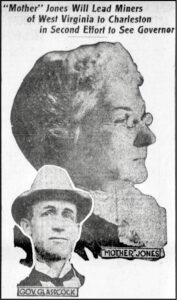
 —————
—————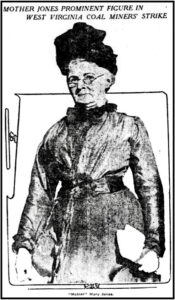
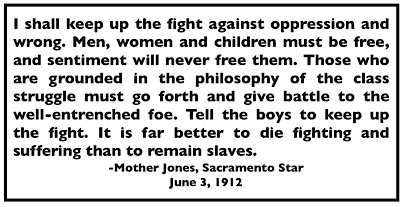 —————
—————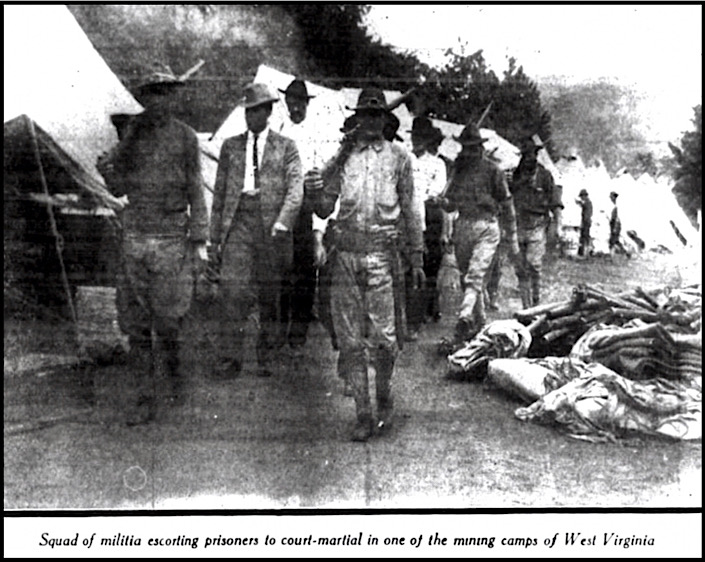

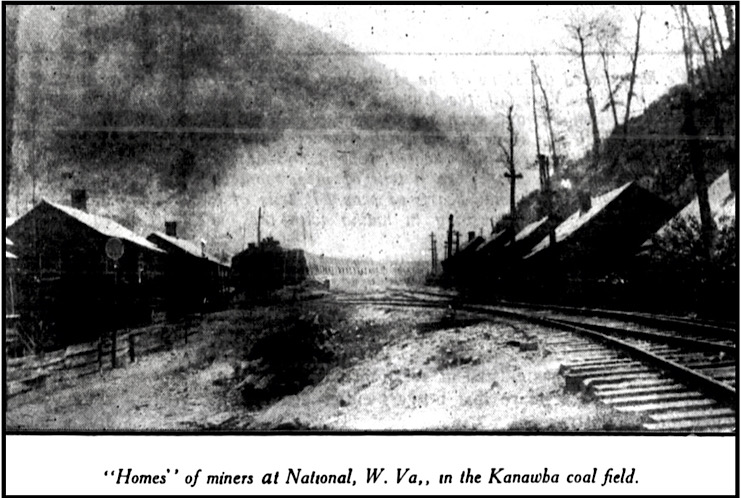
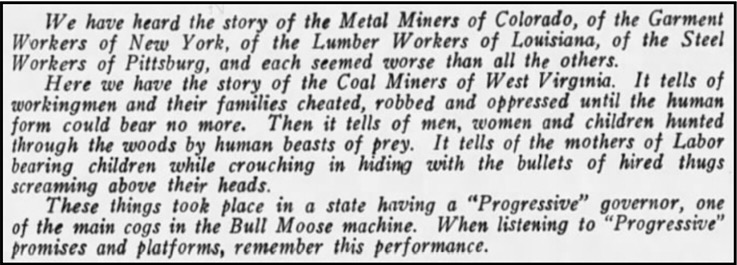 —–
—–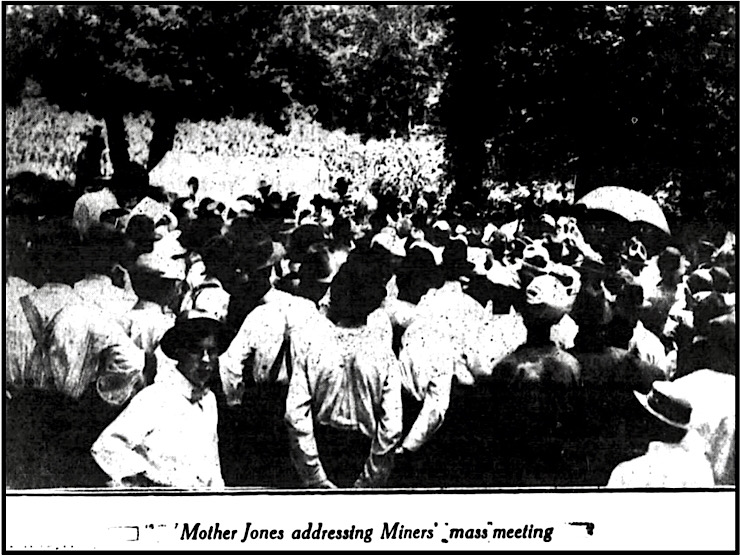
 —————
—————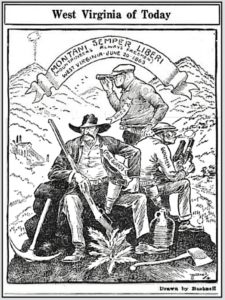
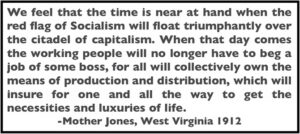 —————
—————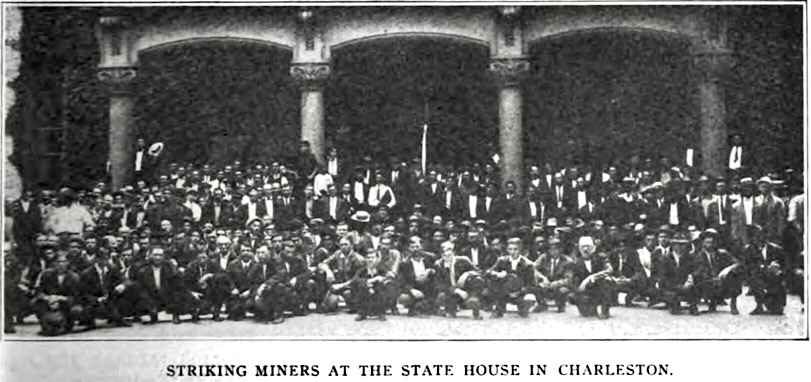
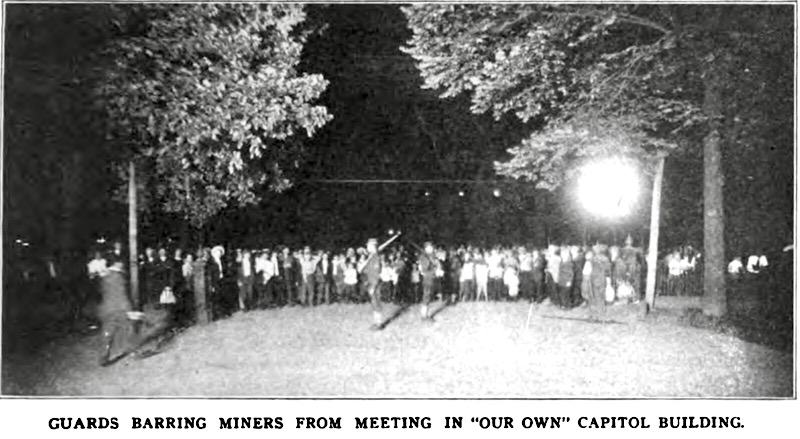
 —————
—————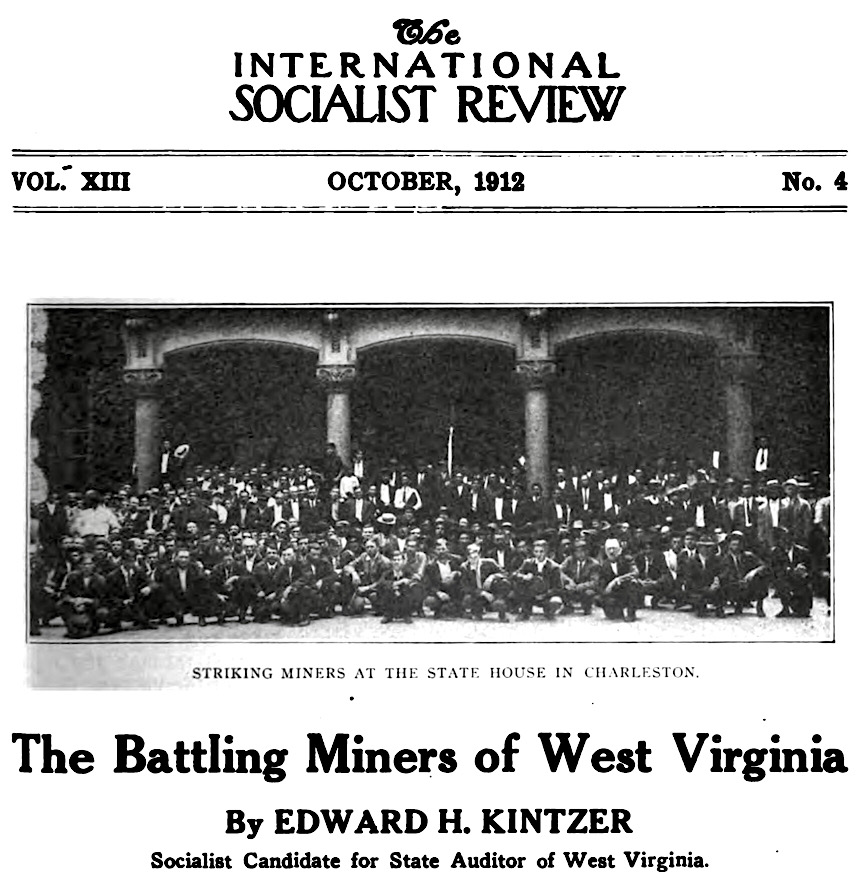 ———-
———-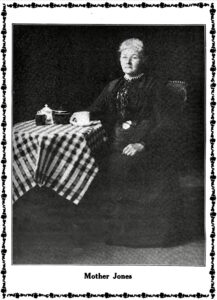
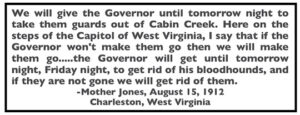 —————
—————
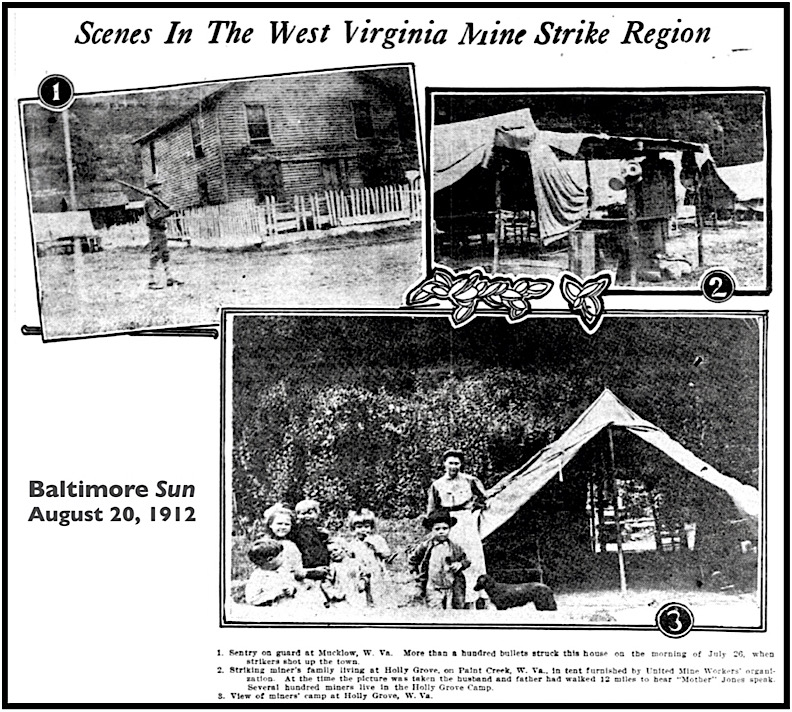 1. Sentry on guard at Mucklow, W. Va. More than a hundred bullets struck this house on the morning of July 26, when strikers shot up the town.
1. Sentry on guard at Mucklow, W. Va. More than a hundred bullets struck this house on the morning of July 26, when strikers shot up the town. 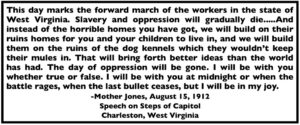 —————
—————